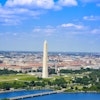China Center
The Chamber's China team helps bolster the U.S.-China economic and commercial relationship in a number of key areas and industries, including intellectual property rights, capital markets, and environmental reform.
The China program addresses challenges in the emerging areas of Chinese standards, competition, government procurement, and patent policies. It conducts programs with Chinese and U.S. government, corporate, and association stakeholders on the important role of American business in China's efforts to build an innovative economy.
The China program works to build a platform to facilitate sustained dialogue and information sharing between U.S. and Chinese stakeholders in the area of corporate citizenship.
The China program manages a Greater China Initiative, consisting of an array of programs, including dialogues such as the Hong Kong-United States Business Council, and activities focused on increasing trade and investment between the United States, Taiwan, and Mongolia.
Featured Event
The China Business Conference is the premier forum for exchanging ideas on U.S.-China economic and commercial relations, including economic, political, and regulatory developments affecting American business in China. The annual event brings together business leaders, public officials, and policy experts to discuss critical issues in the relationship and shape the bilateral policy agenda. A stellar line up of speakers will bring expertise and perspectives from across the business, government, industry, and think tank communities on critical issues such as how to tackle China's unfair trading practices and use of economic coercion, and how to protect U.S. national security and values while continuing to do business with the world's second largest economy in areas that are beneficial to American companies, workers, farmers and our broader economy.
Looking back
The 2023 conference opened with a welcome reception on the evening of May 8, followed by substantive panels over two days on May 9 and 10 covering the full suite of issues weighing on bilateral relations. In light of persistent global economic challenges, growing calls for U.S.-China decoupling, and challenging politics in both countries, the content of the 2023 conference was rich, and participation was exceptionally robust.
Leadership
Latest Content
“This is not the right approach.” WASHINGTON, D.C. — U.S. Chamber of Commerce President and CEO Thomas J. Donohue today issued the following statement: “Imposing tariffs places the cost of China’s unfair trade practices squarely on the shoulders of American consumers, manufacturers, farmers, and ranchers. This is not the right approach.”
WASHINGTON, D.C. — U.S. Chamber of Commerce President and CEO Thomas J. Donohue issued the following statement regarding the administration’s decision to impose $50 billion of tariffs on Chinese imports:
It’s important that the U.S. and China agree on a common set of rules for the global economy and international trade—and then live by them.
BEIJING, CHINA—The U.S. Chamber of Commerce and the China Center for International Economic Exchanges (CCIEE) today opened the tenth meeting of the U.S.-China CEO and Former Senior Officials’ Dialogue, co-chaired by U.S. Chamber President and CEO Thomas J. Donohue and CCIEE Chairman and Former Vice Premier Zeng Peiyan. They are joined by top business leaders, former cabinet officials, and think tank experts for two days of discussions in Beijing.
On May 11, 2018, the U.S. Chamber of Commerce submitted comments to the Office of the United States Trade Representative (USTR) regarding "Proposed Determination on Action Pursuant to Section 301: China's Acts, Policies, and Practices Related to Technology Transfer, Intellectual Property, and Innovation."
The bottom line on China is simple: Compete we will, but cooperate we must.
9th China Business Conference Remarks by THOMAS J. DONOHUEPresident and CEO, U.S. Chamber of Commerce Washington, D.C. May 1, 2018 Remarks as prepared for delivery. Good afternoon, ladies and gentlemen, and thank you for being here. I’m excited to introduce our luncheon speakers, who are going to engage in what’s certain to be a fascinating and thought provoking discussion.
The best path to solve trade concerns is to work with U.S. partners to forge agreements that guard against state capitalism.
The U.S. economy faces one real policy threat in 2018, and that’s a trade war.
In response to today’s Executive Memorandum on China’s forced technology transfer policies and intellectual property theft, U.S. Chamber Executive Vice President and Head of International Affairs Myron Brilliant issued the following statement:




